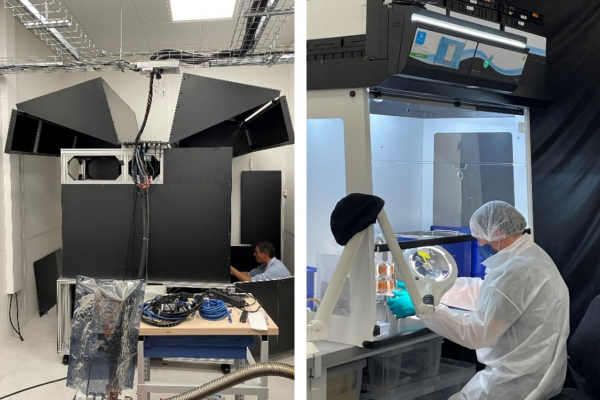GENCI/CEA, FZJ, and PASQAL Announce Significant Milestone in Hybrid Computing
Concrete First Results on 100+-Qubit HPCQS Systems Pave the Way for Hybrid HPC/Quantum Applications
In the context of the SuperComputing 2023 conference in Denver (SC23), Grand Equipement National de Calcul Intensif (GENCI), Commissariat à l’énergie atomique et aux énergies alternatives (CEA), Forschungszentrum Jülich (FZJ), and PASQAL are demonstrating progresses in the framework of the European project High-Performance Computer and Quantum Simulator hybrid (HPCQS). Indeed, HPC-Quantum Computing applications in finance, pharma, and energy are leveraging the upcoming quantum computers that are currently being installed at the supercomputing centers CEA/TGCC (France) and FZJ/JSC (Germany), providing already concrete results.
Now, PASQAL is delivering two 100+-qubit quantum computers to its first customers in France (GENCI/CEA) and Germany (FZJ). These devices, acquired in the framework of the European project HPCQS, and co-funded by the EuroHPC Joint Undertaking, France and Germany, will be coupled respectively with the Joliot-Curie and JURECA DC supercomputers.
Over the past months, several HPC-Quantum Computing and Simulation (HPC-QCS) applications have been studied on the targeted 100+-qubit quantum computing platform based on neutral atoms. These explorations have involved several industrial partners from various fields who provided practical use cases that, with the support of the PASQAL team, were ported on the quantum system, enabling the development of more efficient drugs, more efficient electricity consumption, and competitive advantage in risk management.
A significant illustration of this is the development of a novel quantum algorithm to accelerate drugs discovery. A joint collaboration between PASQAL and the Qubit Pharmaceuticals startup has been launched end of 2021, co-funded by the Pack Quantique (PAQ) initiative of the Region Ile-de-France for an 18-month project. This collaboration aims at improving the understanding of protein hydration, a crucial element in determining how the medicine candidate can inhibit the toxic behaviour of the targeted protein. A preliminary version of the algorithm for identifying the presence of water molecules in the pockets of a protein has been implemented on PASQAL's analog quantum computer to validate theoretical predictions with impressive match. The follow up of this project is being co-funded by the Wellcome Trust Quantum for Bio programme.
PASQAL will showcase this exploration in favour of commercial and strategic advantages on the booths of both CEA and FZJ/JSC at the SuperComputing 2023 conference in Denver through live demos.
The two PASQAL quantum computers will be accessible to a wide range of European users in 2024. They are the first building blocks of a federated European HPC-QCS infrastructure that will also consist of the six quantum computers acquired by the EuroHPC JU and hosted in France (GENCI/CEA), Germany (LRZ), Czech Republic (IT4I @ VSB), Poland (PSNC), Spain (BSC-CNS) and Italy (CINECA).
HPCQS users are already able to validate their use cases through various entry points, such as the Pulser environment deployed on the Joliot-Curie and JURECA DC environments, as well as thanks to remote access to a 100+-qubit device hosted on PASQAL’s premises in Massy, France. Currently, some HPCQS users from JSC are performing remote simulations on this device to benchmark it and to demonstrate quantum many-body scarring, a phenomenon that has recently attracted a lot of interest in foundations of quantum statistical physics and potential quantum information processing applications. European end-users will also soon have access to a more scalable, tensor network-based emulator from PASQAL, called EMU-TN, which will also be deployed on both French and German environments.





